-
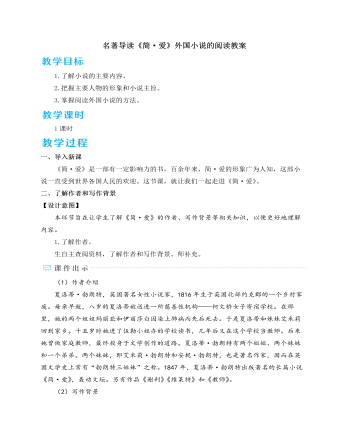
人教部编版语文九年级下册名著导读《简·爱》外国小说的阅读教案
预设 简·爱是一个坚强朴实、刚柔并济、独立自主、积极进取的女性。她出身卑微,相貌平凡,但并不以此自卑。她蔑视权贵的骄横,嘲笑他们的愚笨,显示出自立自强的人格和美好的理想追求。她有顽强的生命力,从不向命运低头,最后有了自己所向往的美好生活。简·爱对自己的思想和人格有着理性的认识,对自己的幸福和情感有着坚定的追求。在她身上,体现了新女性的特点:自尊、自重、自立、自强。六、探究小说的主题思想【设计意图】在理解小说内容和人物形象的基础上,进一步探究小说的主题思想。小组讨论,《简·爱》的主题思想是什么?请简要分析。预设 《简·爱》阐释了这样一个主题:人的价值=尊严+爱。小说中简·爱的人生追求有两个基本“旋律”:富于激情、幻想和反抗精神;追求超越个人幸福的至高境界。这部小说通过叙述一个孤女坎坷不幸的人生经历,成功塑造了一个不安于现状、不甘于受辱、敢于抗争的女性形象,反映了一个小写的人要成为一个大写的人的渴望。
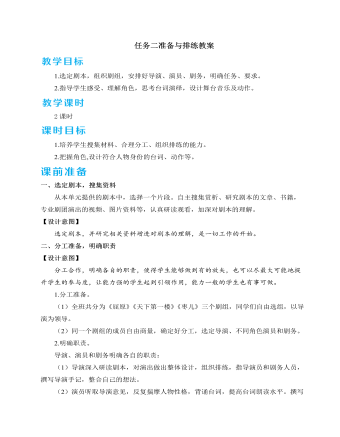
人教部编版语文九年级下册任务二准备与排练教案
教师指导:每个表演小组可选剧务两名,负责服装道具的制作和音乐的准备。负责服装道具的同学要动手能力强,有一定的美术功底。负责配乐的同学对音乐有所了解。在适当时候教师可以给剧务同学提供相应的帮助。【设计意图】教师在指导的基础上,组织学生进行排练,排练过程中把自主权交给学生,充分锻炼学生的合作能力。三、合作排练根据研讨反馈,导演组织全剧组排练,剧务根据表演需要设计制作场景、服装,演员反复合练,及时发现表演、舞台、配合等各方面的问题,为“任务三”正式演出做好准备。本次教学设计的任务是准备与排练,学生虽有参与的热情,但组织剧组,担任导演、剧务等工作尚缺乏相关经验,因此在活动中,老师在其中承担顾问工作,给予必要的指导。对于并未接受过专业表演训练的同学们来说,要演好剧情,演活剧本并非易事,还需要多尝试,多训练。因此,在进行必要的排练指导后,就放手让学生去排练。
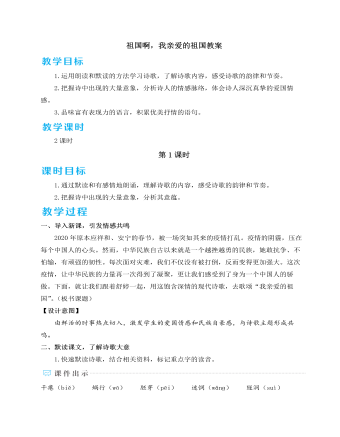
人教部编版语文九年级下册祖国啊,我亲爱的祖国教案
诗歌创作个性十足,难以用统一的规律去分析,然而发掘一些欣赏诗歌的一般性的思路和角度,可以让阅读诗歌有章可循,减少学生读诗时的畏难情绪。在第1课时中,我以朗读为贯穿课堂的抓手,让学生通过思考“怎么读”,自觉地去发现并分析诗歌中的意象,理解诗歌大意,让学生对诗歌有初步的理解和体会。第2课时在整体把握诗歌的基础上,具体去分析诗歌中富有表现力的语言,训练学生深入思考的能力,引导学生梳理诗歌的情感脉络,体会诗中作者的情感变化,理解诗人想要表达的真挚情感,并通过拓展阅读让学生尝试自己解读诗歌,帮助学生巩固所学的阅读诗歌的方法。两节课的侧重点不同,但都围绕这首诗的特点和整体教学思路进行规划,做到“一课一得”。写作背景舒婷初中毕业后下乡插队,后又当过工人。在国家蒙难、人民遭殃的非常岁月,备尝艰辛的舒婷,内心的迷惘、痛苦可想而知。1978年12月,中国迎来了具有重大历史意义的十一届三中全会,开启了改革开放的历史新时期。1979年4月,诗人面对祖国摆脱苦难、正欲奋飞的情景,以自己独有的抒情方式写下了此诗。
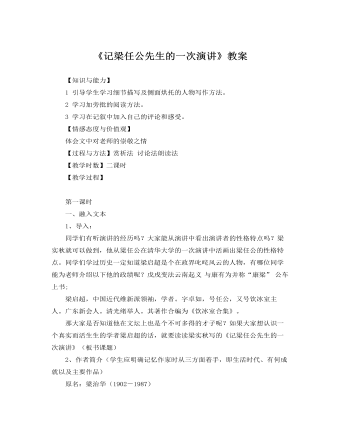
人教版高中语文必修1《记梁任公先生的一次演讲》教案
三、教师总结:在那如火如荼的苦难岁月,梁任公的政治主张屡屡因时而变,但为人处世的原则始终未变,他不是冯自由等人所描述的那种变色龙。他重感情,轻名利,严于律己,坦诚待人。无论是做儿子、做丈夫、做学生,还是做父亲、做师长、做同事,他都能营造一个磁场,亮出一道风景。明镜似水,善解人意是他的常态,在某些关键时刻,则以大手笔写实爱的海洋,让海洋为宽容而定格,人间为之增色。我敢断言,在风云际会和星光灿烂的中国近代人才群体中,特别是在遐迩有知的重量级历史人物中,能在做人的问题上与梁启超比试者是不大容易找到的。四、课后作业:找出文中细节及侧面描写的地方,想一想这样写有什么好处,总结本文的写作特点。五、板书设计:梁任公演讲特点:
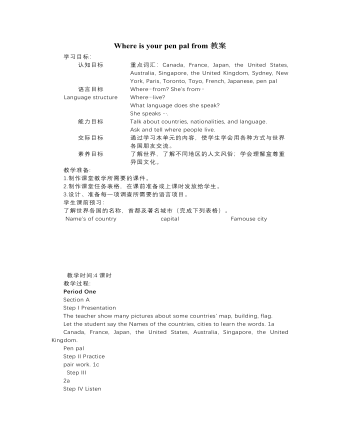
人教版新目标初中英语七年级下册Where is your pen pal from教案
2.1Match the country with the language.Step II Reading3a? let the students read the letter fast and answer the questions.? Let the students ask more questions about the letter as possible as the can.Step III Writing3b.Step IV. Pairwork2cStep V Listening2a, 2bStep V. HomeworkExercises book(1) P3Exercises book (2) P3Period FourStep I . Dictate the words and sentences in Unit1.Step II. Self-checkStep III. Check the answers for Exercises book in the unit.Step IV. Home workRevise and preparation for unit 2.教学反思:通过本单元的学习,学生基本可以谈论人们的国籍,居住城市及其所说的语言,通过书信方式去介绍自己并寻找笔友。但在涉及到国外的一些城市时,学生对这方面的知识相对欠缺,能介绍的城市并不多,也反应出学生课前预习不充分,这跟学生学习条件也有关,大多数学生无法通过网络获取所需信息。因此,在以后的教学中要多指导学生通过计算机网络获取信息,拓宽知识面。

人教版新目标初中英语八年级上册Can you come to my party教案3篇
Step 3 (3b)First, tell the students when we talk about our future plans, we often use: I’m+verb+ing When we talk about what we must do, we use have to. Ask the students to fill in the blanks in 3b. The answers are: shopping, go to see, a test, I’m going, my family. Step 4 (3c)Let the students write an e-mail message to a friend. Say why you can’t visit next. Before the exercise, ask the students to give some possible answers and write them on the blackboard. So the students will feel easy to finish the writing exercise. After they finish it, Let them to correct it in groups first. Each group chooses theirs best one to read in front of the whole class. Step 5 ( planning a party )First read the conversation in the box together. Then ask the students to turn to page 88.Write down everything you have to do next week. Write in all the things you have to do . Ask the students to look at the list. Ask them “What day are you free?” This is when you can have your party. Step 6 (Self check 1 )Let the students to fill in the blanks with the words given. Change the forms of the words if possible. Then make their own sentences. The answers are: visit, playing, have to, study, comeStep 7 (Self check 2)Imagine you are Marie. Read the information and look at your schedule. Write replies to the invitation.

人教版新目标初中英语八年级上册What are you doing for vacation教案2篇
Teaching goals : 1. Words & phrases: babysit ,get back , fishing , rent , think about , decide(on) , tourist etc. 2. How to talk about future plans . 3. 现在进行时表示将来计划或行动. 4. 特殊疑问句(where , when , how long引导) Important and difficult points : Drills :What are you doing for vacation ? I’m watching TV . When are you going ? I’m going … . How long are you staying ? We’re staying for five days . Teaching aids : cards and a tape ,a large wall calendar . Period 1 Teaching procedures : Step 1Leading in1. Free talk . 2. Put up the wall calendar . T: I’m staying home on Saturday (pointing to next Saturday ).Ss repeat . Ss: I’m staying home on Saturday . T: OK. Today we’ll learn how to talk about future plans. Step 2Pre-task SB Page 13 , 1a . 1. Look at the picture carefully and tell what you see in the picture . 2. Write the activities from the pictures in the box and add some more . 3. Practice reading . Step 3While-task1. Using the activities we write in 1a to make conversations .For example :What are you doing for vacation ? I’m visiting my uncle . 2. Pairwork .Practice in pairs . 3. 用第三人称练习对话.
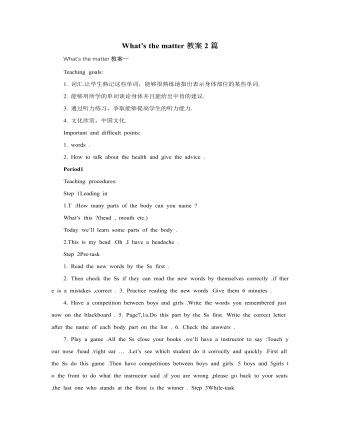
人教版新目标初中英语八年级上册What’s the matter教案2篇
She shouldn’t go to the party tonight.Step7. TaskT: You know, there are lots of problems in our life. If you are a doctor, please tell us how to solve the problem. I will divide you into 9 groups. Please work in groups. And then choose one of you to report your ideas.The following are the problems:I have a toothache.I am hungry. I have a sore throat.I am stressed out. I have a sore back.I am tired. I can’t sleep.I have a cold. I have a headache.Report: If you have a headache, you should go to bed early. You should see the doctor. You should eat some medicine. You shouldn’t wash your face with cold water.You shouldn’t sleep late.You shouldn’t swim.…..T encourages the students to give advice as much as possible.Homework:1. Chose one of the problems, and write down your advice2. Copy the new words这一步是用于热身的,同时也可以让他们复习一部分的表示人体部位的单词,扩充知识.学习语言的过程也是一个不断积累的过程,复习旧知识,增添新知识.通过小游戏,强化学生对Does she/he have…这个句子的运用能力.通过复习,自然的引到下面新知识的学习。充分利用表格,由句子到对话,再到文章,让学生循序渐进. 提高学生的综合语言运用能力,运用以前学过的知识来解决身边的问题.Period 5 (Section B 3a—3c, selfcheck)教学内容与分析:

人教版新目标初中英语八年级下册He said I was hard-working教案2篇
This activity introduces some new vocabulary and provide oral practice using the target language.Task 1 . Ask four students to stand in front of the class, and the teacher asks them the following questions as a reporter.1.What are you going to do when you grow up?2.What are you going to do next week?3.What are going to do after school?The students will give different answers, then ask a good student to report what they said.I am going to e a doctor.What did she say?----------She said she was going to be a doctor.I am going to have a party on Friday night.What did he say?-------He said he was going to have a party on Friday night.I am going to do my homework.What did she say ?------ She said she was going to do her homework.I am going home after school.What did she say?-----She said she was going home after school.Say In this unit we are going to learn to use words like to report what someone said.Task 2. Read the instructions. Then ask a student to read the four questions. And write the words on the Bb. Explain what soap opera is.Task 3. Ask the students to Look at the pictures, point out the TV screens in the picture. Ask one girl to read what Marcia said.What did Marcia say? She said She said she was having a surprise party for Lana on Friday night. Repeat the other pictures in the same way.Activity3. Listen and number the pictures in activity 1a.
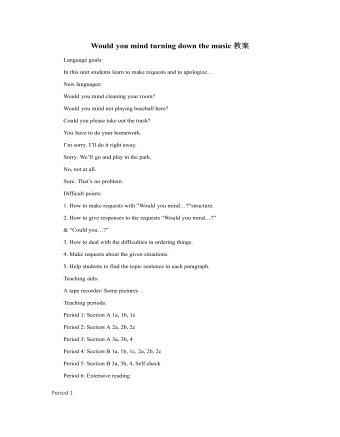
人教版新目标初中英语八年级下册Would you mind turning down the music教案
Step 4. Group work (4)1. Ask a pair of students to read the dialogue. Say, This activity provides speaking, listening and writing practice using the target language.2. Ask students to complete the work in groups.3. Check the answers with the whole class. 4. Explain some of the language points. Step 5. Word review (Self check 1)1. Ask students to read the words and the phrases given. 2. Fill in the blanks with proper forms of these words to complete the sentences. 3. Check the answers with the whole class. Homework:Do activity 2 on page 57 after class. Period 6Teaching aims: 1. Teach vocabulary words and the useful expressions. 2. Enable the students to learn etiquette in different culture. 3. Help the students learn how to behave politely in public places and in daily life. Teaching procedures:Step 1. RevisionHelp students to review the function of making requests through a free talk. Then lead them to the topic of etiquette. Explain the meaning of etiquette. Or, ask students to look it up in the dictionary. Step 2. Pre-reading (Section 1)1. Ask students to read the picture and make a list with their partner about how many rules of etiquette can be seen being broken.
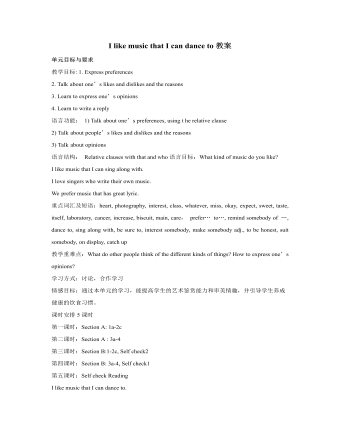
人教版新目标初中英语九年级上册I like music that I can dance to教案
教学目标: 1. Express preferences2. Talk about one’s likes and dislikes and the reasons3. Learn to express one’s opinions 4. Learn to write a reply 语言功能: 1) Talk about one’s preferences, using t he relative clause2) Talk about people’s likes and dislikes and the reasons3) Talk about opinions语言结构: Relative clauses with that and who语言目标:What kind of music do you like?I like music that I can sing along with.I love singers who write their own music.We prefer music that has great lyric.重点词汇及短语:heart, photography, interest, class, whatever, miss, okay, expect, sweet, taste, itself, laboratory, cancer, increase, biscuit, main, care, prefer… to…, remind somebody of …, dance to, sing along with, be sure to, interest somebody, make somebody adj., to be honest, suit somebody, on display, catch up教学重难点:What do other people think of the different kinds of things? How to express one’s opinions? 学习方式:讨论,合作学习情感目标:通过本单元的学习,能提高学生的艺术鉴赏能力和审美情趣,并引导学生养成健康的饮食习惯。课时安排5课时第一课时:Section A: 1a-2c第二课时:Section A : 3a-4第三课时:Section B:1-2c, Self check2第四课时:Section B: 3a-4, Self check1第五课时:Self check ReadingI like music that I can dance to.

人教版新目标初中英语九年级下册I’ll help clean up the city parks教案
Talk about offering help (P60)I’ll help clean up the city parks.A: I’d like to work ...B: You could help ...Talk about ways to tell people about the Clean-Up Day (P61)We need to ...We can’t ...I’ll ...Talk about the work the volunteers do (P62)These three students all volunteer their time to help other people.Somebody loves to ... / helps ... / plans to ... / wants to ...A: What do you like doing?B: I like ... A: What kind of volunteer work do you think I could do?B: You could ...1. 重点词汇advertisement, fix, repair, pleasure, blind, deaf, shut, carry, specially, fetch2. 认读词汇hunger, homeless, cheer, clean-up, sign, establish, major, commitment, elementary, veterinarian, coach, similar, call-in, strategy, disabled, organization, unable, support, appreciate, donation, part of speech, pronoun, adverb, preposition, conjunction, donate, Jimmy, Sally3. 词组clean up, cheer up, give out, put off, set up, think up, take after, fix up, give away, put up, hand out, work out, at once

新人教版高中英语必修1Unit 1 Teenage Life-Listening and Speaking & Listening and Talking教案
Step 2 Listening and Talking1. The teacher is advised to talk with their new students about the related topic: Boys and girls, do you know some structures to talk about future activities? Talking about future activitiesWe’ll …I plan to …There’ll be …I hope to …We’re going to …2. After their small talk, the teacher can move on by playing the listening and solve the following task.Underline the expressions in the sentences below Cao Jing and Max use to talk about the future.We’ll learn useful skills.I plan to improve my spoken English.There’ll be students from different schools.I hope to make new friends.We’ll talk about teenage life.I’ll learn to make a fire.There’ll be students from different countries at the camp.There’ll be some experts there to show us how to live in the wild.We’re going to learn about wildlife.I’m going to give a speech.I think I’m going to enjoy the activities.I think we’ll have a lot of fun.3. Work in groups. Plan a youth camp.Teacher make the Ss think of ideas for the camp. And they can use the questions below to get started. And have the Ss present their ideas for a youth camp to the class.●What kind of camp is it?●Who will be there?●What will they do?●What will they learn?
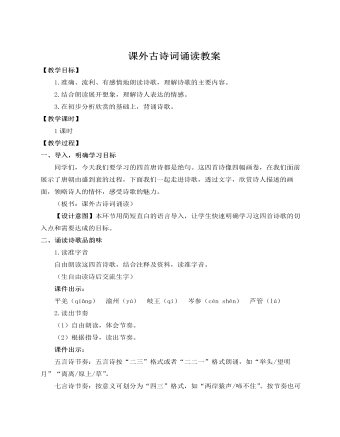
人教部编版七年级语文上册课外古诗词诵读(一)教案
(1)示例一(横向联想) 李白的送别诗:①“思君不见下渝州”,表达依依惜别的无限情思,可谓语短情长。②“仍怜故乡水,万里送行舟”,意思是“我”还是怜爱故乡的水,流过万里送“我”远行。这一句运用了拟人的修辞手法,将故乡水拟人化,借写故乡水有情,不远万里,依依不舍送“我”远别故乡,表达了诗人离开故乡时依依不舍、思念故乡的感情。③“孤帆远影碧空尽,唯见长江天际流。”这两句看起来似乎是写景,但在写景中包含着一个充满诗意的细节。李白一直把朋友送上船,船已经扬帆而去,而他还在江边目送远去的船帆。李白望着帆影,一直看到帆影逐渐模糊,消失在碧空的尽头,可见目送时间之长。帆影已经消失了,然而李白还在翘首凝望,这才注意到一江春水,在浩浩荡荡地流向远远的水天交接之处。“唯见长江天际流”,是眼前景象,可是谁又能说是单纯地写景呢?李白对朋友的一片深情,李白的向往,不正体现在这富有诗意的神驰目注之中吗?诗人的心潮起伏,不正像那浩浩东去的一江春水吗?
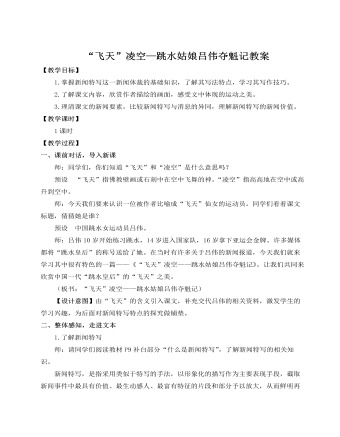
人教部编版语文八年级上册“飞天”凌空——跳水姑娘吕伟夺魁记教案
中国女子跳水五位著名运动员“跳水女皇”高敏是我国首位奥运跳板跳水金牌获得者,自1986年夺得第一个国际比赛的冠军以来,一直到1992年退役,她包揽了其间包括世界杯、世锦赛和奥运会在内的所有国际比赛的70多个世界冠军。跳水界的传奇人物伏明霞年仅14岁就成了奥运史上最年轻的冠军,被载入吉尼斯世界纪录。同时,这位板台双冠王还是我国奥运史上首位三连冠运动员。“跳水皇后”郭晶晶于1993年进入国家跳水队,2011年正式退役。她共收获了包括世界杯、奥运会、世锦赛和亚运会等在内的31个世界冠军,是世锦赛史上唯一的五连冠得主。吴敏霞在1998年入选国家跳水队,一直被认为是郭晶晶之后的我国跳水队的又一位领军人物。2016年,她收获了个人的第五枚奥运金牌,与邹凯并列我国奥运史上夺金最多的运动员。
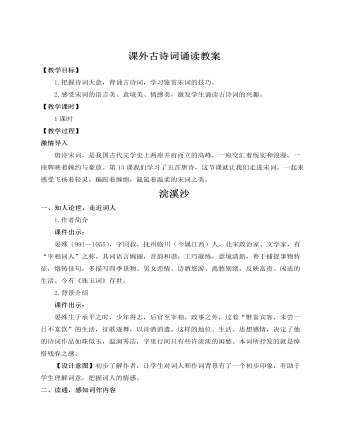
人教部编版语文八年级上册课外古诗词诵读教案
三、品读,感悟词人情怀1.品读“醉”意设问1:再次默读词作。想一想:这首词是围绕哪一个字来写的?从哪些地方可以看出来?预设 “醉”字。表现:沉醉不知归路;误入藕花深处。设问2:词人因何而“醉”?预设 因美酒和美景而“醉”。设问3:除了美景、美酒,还有什么会让李清照“醉”?预设 还有词人和自己的伙伴在一起的那种美好情谊,对年轻时那些美好生活的回忆,都让她深深陶醉。师小结:李清照的“醉”既是酒醉更是陶醉。其实不管“兴”也好,“记”也罢,“醉”也好,还是“误”也好,作者是“字字如金”。因为“兴”所以“醉”,因为“醉”所以“误”,因为“醉”,所以常常记得。2.品字悟情设问1:如何理解两个“争渡”表达出的情感?预设 两个“争渡”,表现了主人公急于从迷途中找寻出路的焦灼心情。正是由于“争渡”,所以又“惊起一滩鸥鹭”,把停栖在沙洲上的水鸟都吓飞了。至此,词戛然而止,言尽而意未尽,耐人寻味。
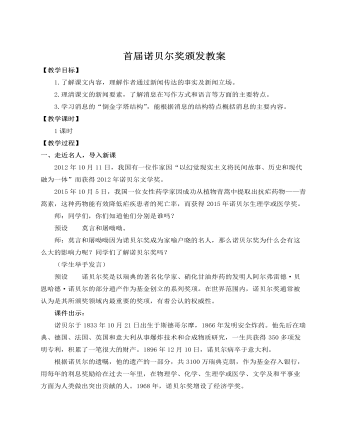
人教部编版语文八年级上册首届诺贝尔奖颁发教案
2000年,老舍先生的儿子、中国现代文学馆副馆长舒乙向外界披露了“1968年诺贝尔文学奖几乎被老舍得到”的内幕。舒乙透露,在入围者到了最后5名时还有老舍,最终,秘密投票结果的第一名就是老舍。那年,瑞典方面通过调查得知老舍已经去世,于是日本的川端康成获奖。1987、1988年诺贝尔文学奖终审名单之中,沈从文均入选,而且沈从文是1988年中最有机会获奖的候选人。诺贝尔文学奖终身评委马悦然曾透露,当时学院中有强大力量支持沈从文的候选人资格。但可惜的是,沈从文于1988年5月10日去世,因此与诺贝尔文学奖失之交臂。疑难突破《首届诺贝尔奖颁发》特别说明资金管理权和评奖权的分离,有什么用意?资金管理权和评奖权的分离能够有效保证诺贝尔奖评奖的公正性。公正性是权威性的基础,诺贝尔奖(特别是它的科技类奖项和文学奖)一百多年以来形成的权威性,与这一分离制度关系密切。就当时而言,诺贝尔奖只是首次颁发,特别需要强调其权威性。
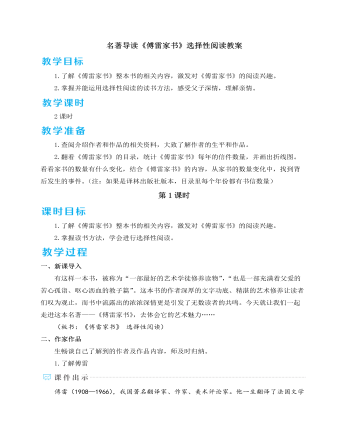
人教部编版语文八年级下册名著导读《傅雷家书》 选择性阅读教案
评价:这段话表明傅雷朋友的角色。他把孩子当成朋友,为人生得一知己而感到兴奋、自豪。在读这段话时声音应洪亮,感情应充沛。小结:我们组还发现傅雷对傅聪的称呼有很多,如聪、聪儿、孩子、亲爱的聪、亲爱的孩子。有时两个同时用,比如“聪,亲爱的孩子!”一直以来,我们都觉得父爱不善表达,可是傅雷的这些亲昵直白的称呼表达了他对傅聪的爱,是这么的温柔,如慈母一般。所以,读这些称呼时我们要读得轻柔深情些。【设计意图】这一环节不仅能展示学生的阅读成果,还能使学生感受到阅读的成就感,并在相互交流中产生更深刻的理解和感悟,在朗读和评价中体会父爱。二、感悟成长1.解读“虎爸”师:在同学们的阅读分享中,傅雷这样一个深爱儿子的父亲形象深入人心。其实,傅雷早期对傅聪的教育是很严苛的,是一个“虎爸”的形象。我们一起来看一则小故事。
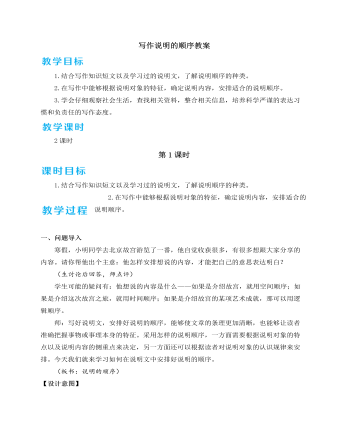
人教部编版语文八年级下册写作说明的顺序教案
片段三:大殿正中是一个约两米高的朱漆方台,上面安放着金漆雕龙宝座,背后是雕龙屏。方台两旁有六根高大的蟠龙金柱,每根大柱上盘绕着矫健的金龙。仰望殿顶,中央藻井有一条巨大的雕金蟠龙。从龙口里垂下一颗银白色大圆珠,周围环绕着六颗小珠,龙头、宝珠正对着下面的宝座。梁枋间彩画绚丽,有双龙戏珠、单龙翔舞,有行龙、升龙、降龙,多态多姿,龙身周围还衬托着流云火焰。——黄传惕《故宫博物院》 (1)找出三个片段中关于说明顺序的标志性词语。预设 片段一:立春过后、再过两个月、不久、于是转入、到了秋天、准备迎接。片段二:首先、此外、还可以、也可以。片段三:正中、上面、背后、两旁、殿顶、中央、周围、下面、周围。(2)学生归纳结论。预设 正确使用标志性的词语,能使对说明对象及内容的介绍更清楚。(3)小组讨论:以时间、空间或逻辑为序的说明语段,通常使用哪些标志性的词语?预设 时间顺序的说明语段一般要运用表示时间或先后的标志性词语;空间顺序的说明语段要运用表示方位的词语,如“东、西、南、北、里、外、左、右”等;逻辑顺序的说明语段可使用“首先”“其次”“再次”等表示由主到次的词语。
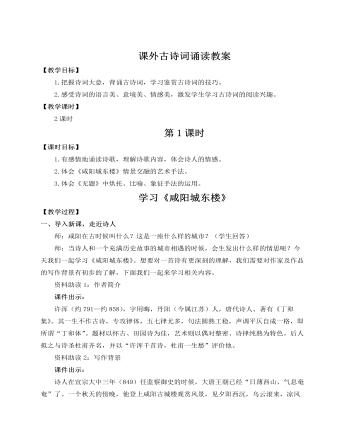
人教部编版语文九年级上册课外古诗词诵读(二)教案
课件出示:少年时指青年时期,从辛弃疾的生平看,这时的他正处于金人统治区内,看到沦陷区的人们在异族的奴役之下,作为血气方刚的爱国青年,油然而生收复失地的报国之志。因而这时的愁情也是真实存在的,那就是对沦陷区人民的同情,对国土沦丧的耻辱感,这时的愁,更多的是一种渴望收复中原、建立不世功业的志愿和动力,是昂扬而充满激情的。2.深入思考,体会“愁”的含蓄之美(1)比较少年时登楼与而今登楼的目的有何不同?预设:少年时登楼,是为了登高望远,抒发自己的豪情壮志。而今登楼,是为了排遣内心的悲愤之情。(2)是什么原因使词人“欲说还休”?预设:统治者处处排挤、打击他,他处处受猜忌,所以有愁不敢说。更主要的原因是,一生抱负付之流水,鬓发苍苍,功业无成,而又没有知音,无人理解。这种孤独的愁情,跟谁诉说,说了又有什么用,这中间也包含着对南宋朝廷的无限失望。因为这种失望,所以辛弃疾“欲说还休”。









